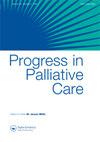不祥之兆:晚期肝病患者在生命即将结束时的抉择
IF 0.9
Q4 PUBLIC, ENVIRONMENTAL & OCCUPATIONAL HEALTH
引用次数: 0
摘要
姑息治疗在终末期肝病管理中的重要作用现已确立,但一些与医生和患者相关的障碍仍可能阻碍及时转诊。在这篇文章中,一个匿名病人的临床过程被描述,一个结束在大多数人认为是一个“坏的死亡”。尽管他的病史明确显示预后不良。根据目前的证据,探讨了临床决定升级护理的原因。这些因素包括对器官支持效用的日益乐观,对预后评分的使用缺乏共识,酒精性肝炎和急性慢性肝病的自由移植方法的例子,移植的必要性,以及患者的偏好。有人提出,如果病人明确表示愿意寻求维持生命的治疗,在某些情况下,“坏死”在道德上是可以接受的。结论是,姑息治疗应该是晚期肝病患者护理的一部分,但肝病学家应该提高技能,更适应临床的不确定性。本文章由计算机程序翻译,如有差异,请以英文原文为准。
The writing was on the wall: Decision making near the end of life in advanced liver disease
The important role of palliative care in the management of end stage liver disease is now well established, but a number of barriers related to physicians and patients may still impede timely referral. In this article, an anonymised patient’s clinical course is described, one which ends in what most would regard as a ‘bad death’. This despite the fact that his history clearly indicated a poor prognosis. The reasons behind the clinical decision to escalate care are explored in light of current evidence. These include increasing optimism around the utility of organ support, lack of consensus around use of prognostic scores, examples of liberal approaches to transplantation for alcoholic hepatitis and acute-on-chronic liver disease, the transplant imperative, and patient preference. A case is made that if a patient has expressed a clear preference to pursue life-sustaining treatment, there will be occasions where a ‘bad death’ is morally acceptable. It is concluded that palliative care should be integral to the care of patients with advanced liver disease, but that hepatologists should be upskilled and become more comfortable around clinical uncertainty.
求助全文
通过发布文献求助,成功后即可免费获取论文全文。
去求助
来源期刊

PROGRESS IN PALLIATIVE CARE
PUBLIC, ENVIRONMENTAL & OCCUPATIONAL HEALTH-
CiteScore
2.60
自引率
11.80%
发文量
24
期刊介绍:
Progress in Palliative Care is a peer reviewed, multidisciplinary journal with an international perspective. It provides a central point of reference for all members of the palliative care community: medical consultants, nurses, hospital support teams, home care teams, hospice directors and administrators, pain centre staff, social workers, chaplains, counsellors, information staff, paramedical staff and self-help groups. The emphasis of the journal is on the rapid exchange of information amongst those working in palliative care. Progress in Palliative Care embraces all aspects of the management of the problems of end-stage disease.
 求助内容:
求助内容: 应助结果提醒方式:
应助结果提醒方式:


